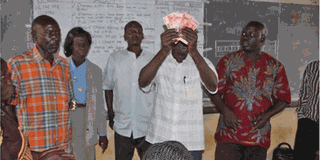Report unearths massive loot of school funds

Accountability. A chairperson of school management committee in Oyam District refunds Shs180,000 he allegedly mismanaged in June. PHOTO BY BILL OKETCH
What you need to know:
The community scorecard found that the Agwingiri PTA chairperson “borrowed” Shs300,000 and was yet to clear a balance of Shs93,000.
Some leaders in Lango Sub- region have been abusing funds meant for government-aided primary schools, a recent report indicates.
A Community Score Card (CSC) undertaken between January and December indicates that village chairpersons, head teachers, School Management Committee (SMC) and Parents Teachers Association (PTA) leaders abused funds meant for schools’ development.
The Apac Anti-Corruption Coalition (TAACC), a non-governmental organisation, that commissioned the study, discovered that the problem was widespread in Dokolo, Oyam, Amolatar, Apac, Kwania and Kole districts.
In Amolatar District, for instance, funds for Agwingiri Primary School were lent out to leaders and some teachers.
The community scorecard found that the Agwingiri PTA chairperson “borrowed” Shs300,000 and was yet to clear a balance of Shs93,000.
TAACC said the former head teacher also “borrowed” Shs1.7 million and had not refunded the money. A total of six teachers were found to have borrowed Shs317,000 from the school development fund and did not refund the money.
Mismanagement
Mr Geoffrey Ebong, the recently appointed head teacher of Agwingiri, acknowledged that the money was shared among the teachers and school leaders.
“When I learnt about this, I alerted the sub-county and I’m sure we shall soon recover the money,” he said.
Mr Camilo Olwit, the Aputi Sub-county chairperson, said head teachers in Amolatar have been discouraging SMC and PTA leaders from banking the school funds claiming that banks “eat” money.
Ms Josephine Acen, the Amolatar District Education Officer, said if schools funds are being misused, “it means it’s the SMC letting us down because they have the guidelines on UPE (Universal Primary Education)”.
“We have trained them and before any money is withdrawn, they must sit in a finance meeting. The education office releases the money monthly, they get clearance from DEO’s office, and make accountability to the district auditor,” Ms Acen said.
In Apac District, the report said the PTA chairperson and another member disappeared with Shs13 million meant for Boke Primary School in 2013/2014 financial year.
Mr Nicholas Kamusiime, the officer-in-charge of Apac Central Police Station, said something has to be done to fight corruption.
“Once we kill the schools, we shall have killed our future,” he said.
The Apac District Internal Security Officer, Mr Fred Ojuka, said: “Everything good or bad falls on leadership and in most cases, auditors are even compromised.”
TAACC further discovered that some village chairpersons deployed to collect development funds for Boke Primary School do not hand them to the school.
Mr James Obala, the Oketo Parish chief, said he was aware of the irregularities.
Chegere Primary School in Apac District was also found operating without any budget or work.
The Ibuje accountant, Mr James Okeng Agany, said an institution that operates without a development plan should be closed.
Way-forward
The Apac assistant chief administrative officer, Mr Emmanuel Awio, said the district would institute a special audit for their 51 government-aided primary schools.
“We also need to talk to teachers on how to manage the little resources under their care,” he said.
At Wigweng Primary School in Oyam Town Council, the scorecard discovered that the SMC chairperson picked money for constructing a pit latrine, but did not complete it.
Mr Innocent Abongo, the Chegere Sub-county chief, said the head teachers, who are the accounting officers in their respective schools in Apac and Kwania, do not know how to manage finances.
The DEO of Amolatar, Ms Josephine Acen, however, told Daily Monitor that they have trained all their SMCs on financial management skills.
Mr Peter Obong Acuda, the Apac District speaker, said Lango is facing corruption because people have bad attitudes.
Why the tool was used
The social accountability tool or community score card was administered in March through May 2019 to generate issues affecting service delivery in the three government schools. This followed reports by locally trained members of the community called the Independent Budget Monitors (IBMS) that the three schools were limping because of the stressing challenges they are faced with. The ultimate goal was to see that service delivery is improved.
Methodology
Issues were generated from the service providers, service seekers and leaders responsible for effective service delivery from the service delivery points. Parents, pupils, teachers and leaders were divided into different groups. Each group identified the gaps that they felt were affecting service delivery and what they had witnessed. Action plans were later developed while issues that could be solved at the service points by stakeholders were highlighted and action taken. Issues that needed the attention of higher authorities were documented and presented to them with the aim of improving service delivery.
Credibility
It is a tested social accountability tool used by development practitioners in the form of an “action research”. CSC is participatory and non confrontational but generates credible evidence for actions by stakeholders.
Service delivery
The social accountability tool or community scorecard was administered in March and May to generate issues affecting service delivery in the government schools.
This followed reports by locally trained members of the community called the Independent Budget Monitors (IBMS) that the three schools were limping because of the stressing challenges.




